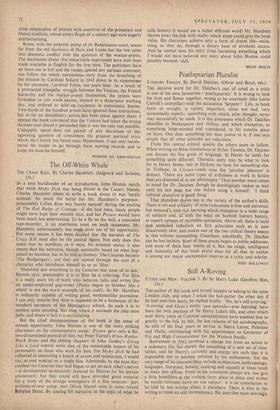The Off-White Whale
IN a neat backhander of an introduction, John Huston recalls that while Moby Dick was being filmed in the Canary Islands, Charles Hamblett (there to write a book about it) was 'barely noticed.' So much the better for Mr. Hamblett's purposes: presumably Lillian Ross was 'barely noticed' during the making of The Red Badge of Courage—if she had been, many people might have kept their mouths shut, and her Picture would have been much less entertaining. To be a fly on the wall, a concealed tape-recorder, is an enormous asset on such occasions. Mr. Hamblett, unfortunately, has made poor use of his opportunity. For some reason it has been decided that the narrator of The Crazy Kill must also be the central figure. Not only does this mean that he sacrifices, as it were, his amateur status; it also means that the narrative, though nominally based on what hap- pened on location, has to be told as 'fantasy. The Canaries become 'The Budgerigars'; and they are viewed through the eyes of a character who introduces himself to us as 'Slim.'
'Hamblett saw something in thc Canaries that none of us saw,' Huston says; presumably if is to Slim he is referring. For Slim is a really nasty bit of work who behaves, talks and writes like an under-employed gag-writer (Pablo began to blubber like a whale' is not the worst example of his craft). As Mr. Hamblett is ordinarily capable of writing good, workmanlike journalese. I can only assume that Slim is intended to be a burlesque of the standard narrators of the Hemingway school. As such it is in patches quite amusing. But even where it succeeds the joke soon palls; and where it fails it is excruciating.
But the chief disappointment of the book is the sense of missed opportunity. John Huston is one of the more, striking characters on the contemporary scene: Picture gave only a flat, two-dimensional portrait of him, but Peter Viertel's White Hunter, Black Heart and the closing chapters of John Godley's Living Like a Lord convey some idea of the remarkable impact of his personality on those who work, for him. For Moby Dick he had collected as interesting a bunch of actors and technicians, I would say, as ever worked on a single film. Admittedly by the time they reached the Canaries they had begun to get on each other's, nerves —a development sardonically fostered by Huston for his private amusement; but they could still have provided good material for a study of the strange atmosphere of a film location : part prisoner-of-war camp; part Oliver Messel suite in some Grand Babylon Hotel. By coating his narrative in the aspic of what he calls fantasy (I would use a rather different word) Mr. Hamblett throws away the link with reality which alone could give the book value. His characters achieve only a form of dream life—swim- ming, as they do, through a dreary haze of alcoholic excess. And he cannot save his story from becoming something which I would not have believed any story about John Huston could possibly become : dull.
BRIAN INGLIS


































 Previous page
Previous page